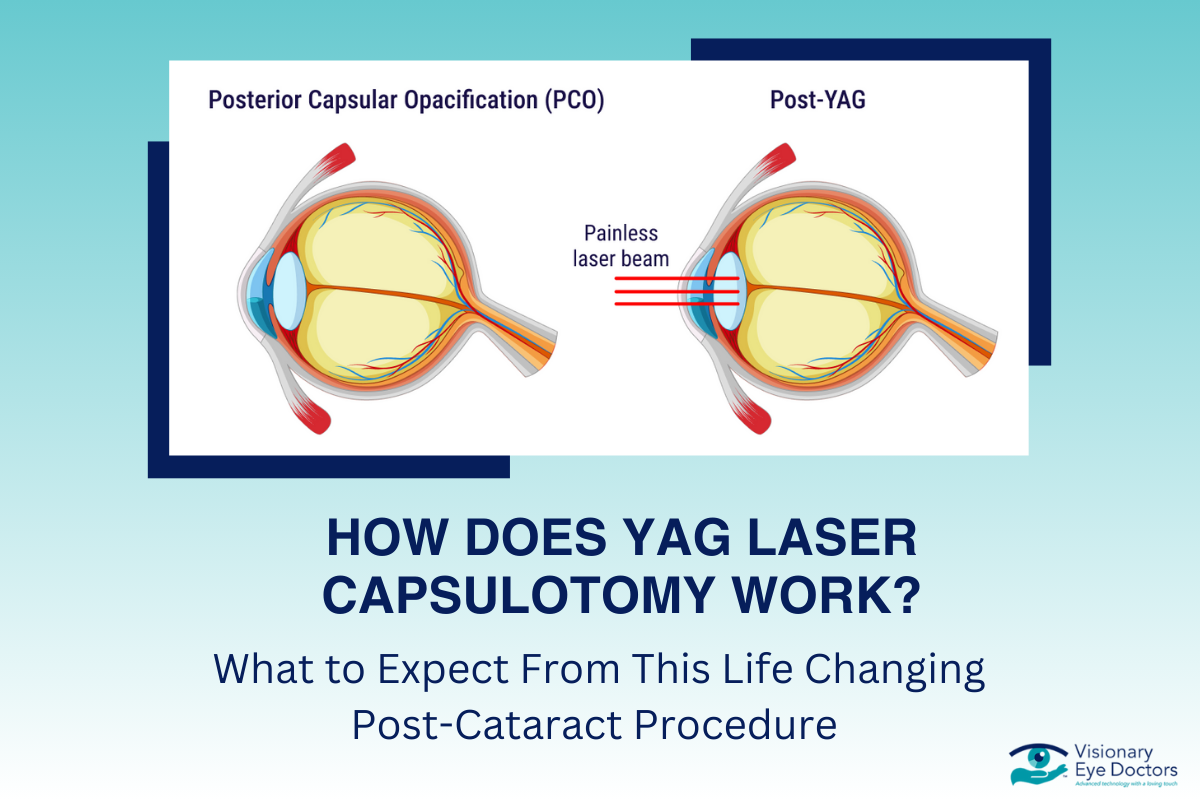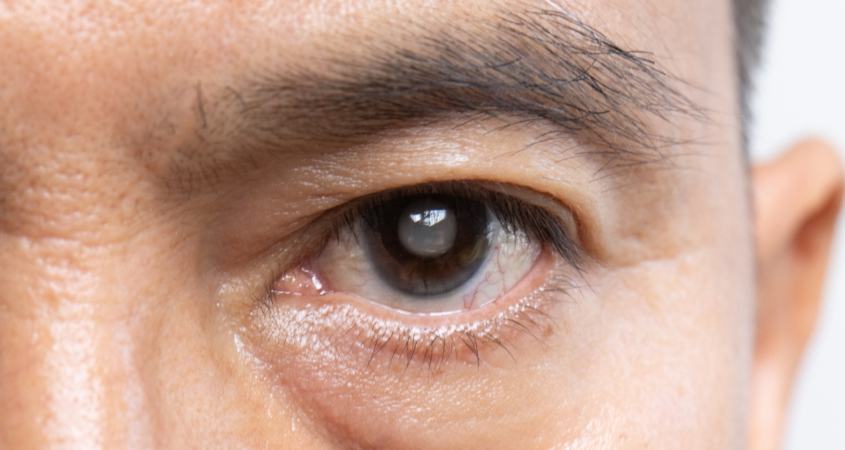Can Cataracts Come Back After Surgery? Understanding Secondary Cataracts
Cataracts, once removed through surgery, do not come back. However, some people may experience similar symptoms after surgery due to a condition called posterior capsular opacification (PCO), often referred to as a “secondary cataract.” This happens when the lens capsule, a thin membrane left in place during cataract surgery, becomes cloudy over time, leading to blurred vision and other issues. Fortunately, this is a common condition that can be easily treated with a quick, painless procedure called YAG laser capsulotomy, which restores clear vision.
In the following sections, we’ll dive deeper into what cataracts are, why secondary cataracts occur, and how they are effectively treated. Understanding these details will help you feel confident in your cataract care and what to expect after surgery.
What Are Cataracts and How Are They Treated?
A cataract is a clouding of the eye’s natural lens, which leads to blurry vision, difficulty seeing at night, and increased sensitivity to glare. Cataracts often develop with age and can interfere with your ability to perform daily activities, such as reading, driving, or recognizing faces. Over time, this clouding worsens, significantly impacting vision and quality of life.
The most effective treatment for cataracts is cataract surgery, which is one of the most common and successful surgical procedures in the world. During this surgical procedure, the cataract surgeon removes the cloudy natural lens and replaces it with a clear, artificial intraocular lens (IOL). This new lens restores clear vision, allowing you to return to your normal activities without the hindrance of cataract symptoms.
Cataract surgery is typically performed as an outpatient procedure and has a high success rate, with most patients experiencing a significant improvement in their vision soon after the surgery. While the cataract itself cannot come back, in some cases, a secondary cataract may develop, which will be explained in the next section.
Can Cataracts Reoccur After Surgery?

Cataract surgery is highly effective in permanently removing the cloudy lens caused by cataracts. Once a cataract is removed, it does not grow back. However, some patients experience a condition called posterior capsular opacification (PCO), often referred to as a “secondary cataract.” While this is not a true cataract, it can cause similar symptoms, leading many to think their cataracts have returned.
Why Do Secondary Cataracts Develop?
During cataract surgery, the cloudy natural lens is replaced with an artificial intraocular lens (IOL). To hold the new lens in place, the lens capsule, a thin membrane, is left intact. Over time, epithelial cells from the natural lens may migrate to the back of the capsule, causing it to become cloudy. This clouding of the capsule interferes with light passing through the eye, leading to vision problems similar to those caused by cataracts, such as blurred vision, glare, and cloudy vision.
Symptoms of Secondary Cataracts
The symptoms of a secondary cataract closely resemble the original cataract, including a gradual worsening of vision. You might find it difficult to see clearly, drive at night, or read. Some patients also notice increased sensitivity to light or halos around bright lights. These symptoms can be frustrating, especially after the initial success of cataract surgery.
Is It the Same as Cataracts?
It’s important to understand that while the symptoms may feel the same, the secondary cataract is not the original cataract growing back. Instead, it’s the cloudiness of the posterior capsule left behind after surgery that causes the issue. Fortunately, this is a common condition and can be treated easily and quickly. In the next section, we’ll discuss how the YAG laser capsulotomy procedure can restore your vision after secondary cataracts.
Treating Secondary Cataracts: YAG Laser Capsulotomy
When a secondary cataract or posterior capsular opacification (PCO) develops after cataract surgery, the most effective treatment is a procedure called YAG laser capsulotomy. This is a non-invasive, painless laser procedure designed to restore clear vision by removing the clouded portion of the lens capsule.
How Does YAG Laser Capsulotomy Work?

The procedure is simple and quick, often taking just a few minutes. First, your eye doctor will apply eye drops to numb the eye, ensuring that you won’t feel any discomfort. Then, the YAG laser is used to create a small opening in the cloudy posterior capsule, allowing light to pass through unobstructed. This opening clears the vision and eliminates the symptoms caused by the secondary cataract, such as blurred vision and glare.
The best part of the YAG capsulotomy is that it is performed as an outpatient procedure, meaning you can go home shortly after it’s done. Recovery is typically fast, with most patients noticing an improvement in their vision within hours or days.
Is YAG Laser Capsulotomy Safe?
Yes, YAG laser capsulotomy is a very safe and effective way to treat secondary cataracts. Most patients only need this procedure once, and the results are usually permanent. In rare cases, a second treatment may be needed if the capsule becomes cloudy again, but this is uncommon. The risk of complications is very low, and the procedure has a high success rate in restoring clearer vision.
What to Expect After the Procedure
Following the procedure, you might be given eye drops to reduce any mild inflammation and help with the healing process. You’ll likely be able to resume normal activities within a day or so, but it’s important to follow your doctor’s instructions carefully to ensure a smooth recovery.
The YAG laser capsulotomy is a highly effective solution to regain clear vision after a secondary cataract form. If you’ve noticed a return of blurry vision or other vision problems after your initial cataract surgery, this procedure could be the solution to restore your eyesight and quality of life.
The Value of Choosing Visionary Eye Doctors for Cataract Care
When it comes to cataract surgery and post-surgery care, choosing the right provider is crucial for achieving the best possible outcomes. At Visionary Eye Doctors, we offer comprehensive cataract care that addresses every step of the process—from the initial consultation to post-surgery treatments like the YAG laser capsulotomy for secondary cataracts.
Expertise in Cataract Surgery
Our team of highly skilled and experienced cataract surgeons has performed thousands of cataract procedures, ensuring that you are in the best hands. Using the latest advancements in cataract surgery technology, such as laser-assisted surgery and light- adjustable lenses, we are committed to helping our patients achieve not only clear vision but also freedom from prescription glasses for both reading and distance.
Personalized Care for Secondary Cataracts
If you’re dealing with the frustrating symptoms of a secondary cataract, Visionary Eye Doctors can help. Our experts excel in performing YAG laser capsulotomy, a quick, painless procedure that can restore your clearer vision in just minutes. With our patient-centered approach, we ensure that every aspect of your care is personalized to meet your unique vision needs.
Advanced Technology and State-of-the-Art Facilities
At Visionary Eye Doctors, we use cutting-edge technology in both cataract surgery and post-surgical treatments. Our state-of-the-art facilities and highly trained staff ensure that you receive the most advanced care available. Whether it’s your initial cataract removal or addressing a posterior capsular opacification, we are equipped with the latest tools and expertise to provide the highest quality of care.
Take the Next Step Toward Better Vision
If you’re noticing symptoms like blurry vision or glare after your cataract surgery, don’t wait. Schedule a consultation with Visionary Eye Doctors to explore whether a YAG laser capsulotomy or other solutions are right for you. Our team is dedicated to helping you regain your vision and improve your quality of life.
Take the next step today—request a surgical consultation at Visionary Eye Doctors, where your eye health and vision clarity are our top priorities!



